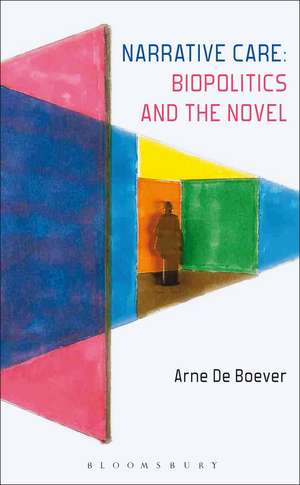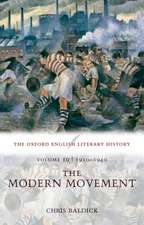Narrative Care: Biopolitics and the Novel
Autor Dr. Arne De Boeveren Limba Engleză Paperback – 22 oct 2014
| Toate formatele și edițiile | Preț | Express |
|---|---|---|
| Paperback (1) | 254.75 lei 6-8 săpt. | |
| Bloomsbury Publishing – 22 oct 2014 | 254.75 lei 6-8 săpt. | |
| Hardback (1) | 653.61 lei 6-8 săpt. | |
| Bloomsbury Publishing – 22 mai 2013 | 653.61 lei 6-8 săpt. |
Preț: 254.75 lei
Preț vechi: 293.96 lei
-13% Nou
Puncte Express: 382
Preț estimativ în valută:
48.79€ • 50.27$ • 40.87£
48.79€ • 50.27$ • 40.87£
Carte tipărită la comandă
Livrare economică 24 februarie-10 martie
Preluare comenzi: 021 569.72.76
Specificații
ISBN-13: 9781628925241
ISBN-10: 1628925248
Pagini: 192
Dimensiuni: 140 x 216 x 10 mm
Greutate: 0.23 kg
Editura: Bloomsbury Publishing
Colecția Bloomsbury Academic
Locul publicării:New York, United States
ISBN-10: 1628925248
Pagini: 192
Dimensiuni: 140 x 216 x 10 mm
Greutate: 0.23 kg
Editura: Bloomsbury Publishing
Colecția Bloomsbury Academic
Locul publicării:New York, United States
Caracteristici
Investigates contemporary fiction's relation to biopolitics and of biopolitics to the novel as genre
Notă biografică
Arne De Boever is Assistant Professor of American Studies and Director of the MA Program in Aesthetics and Politics in the School of Critical Studies, California Institute of the Arts, USA.
Cuprins
Acknowledgements / Introduction: Towards a Pharmacological Theory of the Novel / Chapter One: J.M. Coetzee's Slow Man as "a Biologico-Literary Experiment" / Chapter Two: Bare Life and the Camps in Kazuo Ishiguro's Never Let Me Go / Chapter Three: Life-Writing in Paul Auster's The Book of Illusions/ Chapter Four: "Just Being": On Tom McCarthy's Remainder / Conclusion: Pedro Almodóvar's Talk to Her as a Narrative of Care / Bibliography / Index
Recenzii
De Boever presents a provocative hypothesis about fictional narrative's connection to biopolitics and biopower. The representative contemporary American texts are well-chosen, and his close readings of them forcefully and effectively support his claim that contemporary metafictional narratives, while sometimes complicit with biopower, attempt through various means to resist the biopolitical system.
'It is clear that we cannot go on as before' (142), Arne De Boever states in his paradigm-shifting volume, Narrative Care: Biopolitics and the Novel. De Boever's study carries on a tradition of Foucauldian literary criticism earlier exemplified by D.A. Miller's The Novel and the Police, but it achieves a significant shift in analytical focus: from surveillance to biopolitical control, from the individual body to the body politic, and from narrative discipline to narrative care.
Timely and insightful ... Narrative Care is a uniquely revealing book for anyone engaged in body, gender, ethical, or health studies and naturally also for researchers of the discussed authors.
.[De Boever's] argument on the politics and ethics of narrative is bold, imaginative, and accessible to readers unfamiliar with philosophy and theory on biopolitics.
Novels govern our lives: Narrative Care allows us to understand this statement literally. Should we try to escape the biopolitical scene of literature? Would that cure our political wounds? Arne De Boever offers an alternative solution: to subtract the emancipatory practice of care from its biopolitical appropriation. This solution implies that we think the relations between the novel, aesthetics, and politics anew. It's rare to see a literary critic take such good care of philosophy.
With his signature mode of meticulous reading and bold speculative thinking, Arne De Boever extends the argument from his States of Exception in the Contemporary Novel to advocate further the unique capacity of literature to think through the quandary of contemporary political problems. Narrative Care disrupts the codified narrative of biopolitics by invoking (always in the form of asking questions) literature's way of deciding what might be depicted-written--as life. De Boever's biopolitical history of the novel thus spearheads one of the key epistemological inquiries of our time: how are we to determine (and act upon) the political significance of modernity's logic of the living?
Productively exploiting the tensions between Giorgio Agamben and Michel Foucault, bare life and biopolitics, Arne De Boever leads us into a fascinating critical examination of care and caring for others. Most important, he makes a compelling case that the contemporary novelistic texts he treats use character and characterization, reading and narration, to draw us into a correlative experience of ethical reasoning and world-making.
'It is clear that we cannot go on as before' (142), Arne De Boever states in his paradigm-shifting volume, Narrative Care: Biopolitics and the Novel. De Boever's study carries on a tradition of Foucauldian literary criticism earlier exemplified by D.A. Miller's The Novel and the Police, but it achieves a significant shift in analytical focus: from surveillance to biopolitical control, from the individual body to the body politic, and from narrative discipline to narrative care.
Timely and insightful ... Narrative Care is a uniquely revealing book for anyone engaged in body, gender, ethical, or health studies and naturally also for researchers of the discussed authors.
.[De Boever's] argument on the politics and ethics of narrative is bold, imaginative, and accessible to readers unfamiliar with philosophy and theory on biopolitics.
Novels govern our lives: Narrative Care allows us to understand this statement literally. Should we try to escape the biopolitical scene of literature? Would that cure our political wounds? Arne De Boever offers an alternative solution: to subtract the emancipatory practice of care from its biopolitical appropriation. This solution implies that we think the relations between the novel, aesthetics, and politics anew. It's rare to see a literary critic take such good care of philosophy.
With his signature mode of meticulous reading and bold speculative thinking, Arne De Boever extends the argument from his States of Exception in the Contemporary Novel to advocate further the unique capacity of literature to think through the quandary of contemporary political problems. Narrative Care disrupts the codified narrative of biopolitics by invoking (always in the form of asking questions) literature's way of deciding what might be depicted-written--as life. De Boever's biopolitical history of the novel thus spearheads one of the key epistemological inquiries of our time: how are we to determine (and act upon) the political significance of modernity's logic of the living?
Productively exploiting the tensions between Giorgio Agamben and Michel Foucault, bare life and biopolitics, Arne De Boever leads us into a fascinating critical examination of care and caring for others. Most important, he makes a compelling case that the contemporary novelistic texts he treats use character and characterization, reading and narration, to draw us into a correlative experience of ethical reasoning and world-making.
























